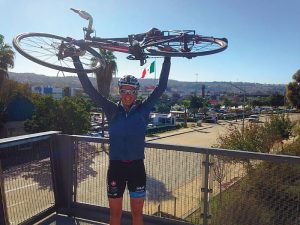Sailor bikes south for mental health
By Lookout on Mar 02, 2015 with Comments 0

In a moment of excitement at completing her 3,000 kilometre journey, SLt Marianne Knai, powerlifts her bike.
While many people were lounging around their living rooms on Boxing Day, helping themselves to Christmas dinner leftovers, or heading out to the malls to shop, SLt Marianne Knai was cycling solo down a rainy highway in Seattle.
Cold and wet, she would not be deterred on the first day of her month-long cycling journey down the Pacific Coast to the Mexican border to raise funds for mental health.
“On my first day, I was cycling down the highway, I had turkey in my belly, and I was vibrating with excitement,” she says.
Her mission originated as a response to the Amyotrophic Lateral Sclerosis Association’s (ALS) ice bucket challenge, in which the public was invited by the ALS to film themselves being dumped over the head with buckets of ice water.
The association encouraged participants to post their videos on social media afterwards.
While SLt Knai saw the heart of the challenge as important, she wanted to find an alternative way to raise funds for a social justice cause, without further wasting a precious resource.
She chose to focus her fundraising on mental health, an issue key to her role as Psychosocial Team Lead at the Canadian Forces Health Services Centre (Pacific). Included among the charities she chose was the Canadian Association for Mental Health, the Kids Help Line, and local mental health organizations.
“I wanted to do the ride so that I could contribute to my community in way that got people together – both civilians and military members – with the common ground being a conversation about mental health,” says SLt Knai.
After a minor setback – a flat tire 80 kilometres in, SLt Knai cut across Washington State to the Oregon coast, where she experienced difficult riding and camping weather conditions – colder than expected temperatures, and wind.
To combat the weather, she often opted to sleep in hostels, except in Oregon where she camped and slept in yurts, solid-floor fabric tent structures equipped with electricity.
A former triathlete, she says her slow-and-steady type of cycling was more about conserving energy, rather than achieving speed, especially considering the weight of her gear.
Two large paniers on either side of her bike, weighing a total of 50 pounds, carried her camping gear, food, emergency supplies, and maps.
To reduce the weight, she wore a single change of clothes, and used the same soap on herself, her dishes, and her laundry.
She updated her progress on her Facebook page whenever she could access wireless internet.
In each place she stopped, she canvassed people about what they did to stay mentally healthy, or inquired as to what mental health meant for them.
She posted their stories on social media.
“Hearing people’s answers reminded me that every person’s story is valuable,” she says.
“We’ve lost sight of the importance of the story. We deeply value people’s physical health stories – we make people get check-ups and physical health assessments – but we’ve lost sight of the mental health aspect.”
She began receiving emails thanking her for the undertaking, or from those relating their mental health experiences.
Her most rewarding email came from an individual who told her that the activity on the Facebook page gave them the strength to say “I need help.”
Word got out about her venture. She was invited to speak at a youth home and various youth groups – engagements that were completely unanticipated.
But also unforeseen was the challenge of emotionally supporting herself during the rough days, without others around to help.
“The most difficult part of doing something like this, solo and unsupported, is relying on you to bring yourself back up from a tough day,” she says.
Other challenges were more easily anticipated such as ensuring she had enough food.
“I consumed between 5,000 and 8,000 calories a day, easily,” she says.
By the time she reached the California coast, SLt Knai was ahead of schedule; she slowed down after she passed through Los Angeles to take in the white, sandy beaches and cliffs reaching down into the water.
“When you’re cycling, you’ve got time. You can see the sea life and the birds, or smell the sweetness of the strawberry and kiwi and pineapple fields.”
On her second to last night, she stayed at a hostel in San Diego, where the hostel’s manager, having heard her story, welcomed her with a free first night’s stay, meal, and a book.
She arrived at the Mexican border almost a week early at the end of January.
“Getting to the border was the toughest thing,” she says. “I just wanted to cross it and keep going.”
At the border she raised her trusty bike that had carried her 3,014 km over her head, and then thought, “Okay, what’s next?”
Next was a flight back to Victoria where she discovered she raised $10,171 for her charities.
“We need to be discussing mental health in a way that doesn’t negatively affect anyone. The stigma surrounding seeking help and discussing mental health issues is still very present, and it needs to be altered,” she says.
Rachel Lallouz
Staff Writer
Filed Under: Top Stories
About the Author:





